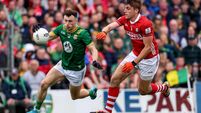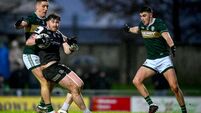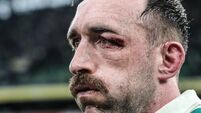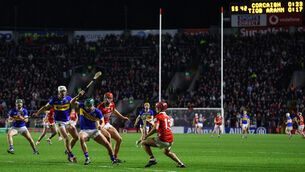Curious case of a natural born thriller
Argentina had beaten Ireland 2-0, with goals from Gabriel Batistuta and Ariel Ortega, but nobody cared about that. We had just watched a 17-year-old Irish kid light up Lansdowne Road on his home debut, fearlessly taking on some of the world’s most famous defenders, dribbling like an Argentinian.
Ireland had produced midfield generals, powerful centre-forwards, and ultra-reliable full-backs by the dozen, but until that night there had never been an Irish pibe. Robbie Keane promised to be the player who would transform our idea of what Irish football could be all about.
Keane went on to play more games and score more goals for Ireland than we would have dared hope for back in 1998. His equaliser against Germany in 2002 is Irish football’s best moment of the last 10 years, and he’s captained Ireland more times than anyone else.
Yet, if you’re asking fans to name the greatest Ireland player of all, they’ll still say Paul McGrath, Liam Brady, John Giles or Roy Keane. Nobody will mention Robbie. Even among current players, Richard Dunne, Shay Given and Damien Duff are more highly regarded.
As captain for six years, Keane has given more press conferences than any other Ireland player. While he is unfailingly polite and cheerful, these conferences are always very boring. Listen long enough though, and amidst the cliches about “no easy games” and “we’re not here to make up the numbers”, you begin to notice something peculiar: Robbie Keane appears to have no memory.
Whenever prompted to speak about a moment in his past — a game he’s played, a goal he’s scored, a stadium he’s visited, an opponent he’s faced — Keane can never remember. He furrows his brow, thinks for a moment. “It was a long time ago...” and nothing comes to mind.
He won his 100th cap against Argentina, so journalists asked what he remembered of that home debut against them in 1998. All he could manage was “it was one of the highlights of my career”, though you got the impression if you pressed him, he wouldn’t be able to tell you why.
It’s not Robbie Keane’s job to give interesting press conferences. His job is to score goals, and he’s done that better than any other Irishman. Yet you wonder to what extent that curious inability to remember much about even major events in his career has moulded him as a footballer.
One of the most perceptive comments I’ve heard about Keane came from the autobiography of the former Norway defender Henning Berg. Berg’s co-author asks him to name the five toughest opponents he’s ever played against, which leads to the following exchange: “Robbie Keane at Tottenham,” Berg says, without pausing to think. “Keane is incredibly difficult to play against. I’m not going to say he’s the best forward in the Premiership, he probably isn’t, but he’s the one I’ve had most problems controlling. Both when he was at Leeds and after he went to Spurs. My strength as a defender is that I’m good at reading my opponent. I’m good at thinking fast. To see what my opponent is going to do at any time. But Robbie Keane doesn’t really have a style of play. He doesn’t move in any particular pattern. He’s quick. He takes chances. He goes straight at goal at full speed and it’s impossible to tell if he’s going to dribble, shoot or pass the ball.”
— How do you contain Keane?
“If you want to be sure, there’s only one way to contain him. That is getting so tight that he doesn’t get the ball, or at least doesn’t get to turn around.”
(For the record, numbers two to five on Berg’s list were Ruud van Nistelrooy, Alan Shearer, Ole Gunnar Solskjaer and Michael Owen).
Here, maybe, is some insight into why a player with so much talent has failed to fit into so many teams, and why he has struggled to form strike partnerships, except with one particular type of partner — a bigger man who creates chances for Keane to finish off: Niall Quinn for Ireland, Dimitar Berbatov at club level.
Keane is a pure creature of instinct, an unconscious genius, with little capacity for reflection and analysis. He has more natural ability than most strikers, and he does what occurs to him without thinking. Really great players do a little bit more than that.
John Giles is the opposite of Robbie Keane. He maintains photographic recall of games he played for the Busby Babes in the 1950s. When he meets up with Leeds players at golf days, they often have to ask him to remind them of events of their own careers.
Memory is more than a party trick for Giles. As a player, he would lie in bed after a game replaying every incident of the match in his head. Did I make the right decision? What might have worked better in that situation?
He says in his autobiography he can never remember a time when he wasn’t “able to kick the ball correctly” but he wasn’t content to enjoy his superior “natural” ability, which might more accurately be described as skill learned before you can consciously remember learning it.
He actively worked to build on his talent: studied his experience, made memory his teacher. That’s why he became a better player with every year. By the time he was 34 and representing Leeds in the European Cup final, every pass made was informed by a million passes he’d made before.
Diego Maradona may not be everyone’s idea of an intellectual giant, but he too had extraordinary faculties of memory. He told his Argentina team-mate Jorge Valdano that when he scored the famous goal against England in 1986, he had made the decision to round Peter Shilton after remembering a similar situation he’d been in against Shilton in a match at Wembley six years earlier.
On that occasion, he had tried to shoot across Shilton and missed; he wasn’t about to make that mistake again. All this had flashed through his mind in the split second before he executed the move. Valdano was dumbfounded. If Keane has ever done something like that in a match, you can bet he’s forgotten about it by now.
Some players, like Ryan Giggs, Gary McAllister, or Andrea Pirlo, improve steadily into their 30s, with the accumulated wisdom of hundreds of matches plain to see in their educated performances. Keane has barely changed since he was 21. To him, experience is like water off a duck’s back, as you could imagine him saying in one of his Ireland press conferences.
While he’s stayed the same, the game has moved on. Football in the late 90s and early 00s was less structured, more box-to-box, with more long balls and more chaotic situations where Keane’s improvisational, individualistic style can do damage.
Today’s top teams prize possession and control. The trend towards ever more collective play doesn’t suit Keane, whose game is all about unpredictable moments. He has never quite worked out any other way to serve a team, or how to impose himself in a match that isn’t going his way. When Ireland lost 3-1 to Croatia, Keane didn’t touch the ball until the 19th minute. The moment he was hoping for never arrived.
But the end needn’t spoil what went before. If Keane decides to retire from international football, he’ll leave Ireland supporters with so many of those moments. He probably won’t remember them, but we will: the header against Holland (and the bullet shot in the 2004 friendly), the volley against Iran, the brilliantly contorted finish against Germany, the penalty against Spain, the calm side-footer against France, the captain’s performance in the play-off against Estonia. 53 international goals is a record that could outlive us all, and he achieved all this without seeming to learn a thing. One day we might see a better striker playing for Ireland, but I don’t think we’ll ever see a more talented one.










